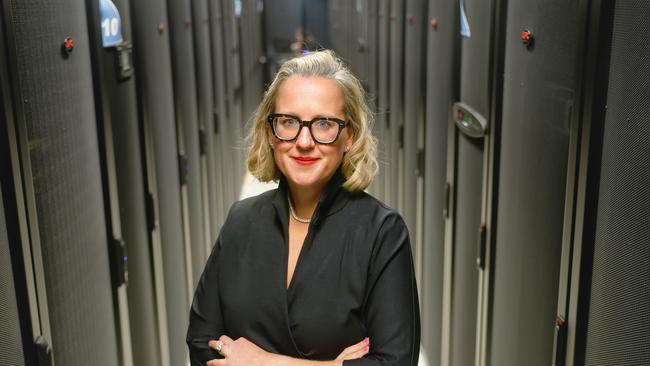Stargate is good, but where are the engineers for the new AI ‘space race’?
A proliferation of data centres is going to create an explosion of new jobs — we just need to find the workers, says a new data centre boss.
A proliferation of data centres is going to create an explosion of new jobs, an Australian operator says, as US President Donald Trump launches a new ‘‘space race’’ against China with the $US500bn ($800bn) Stargate project.
But Alex Coates – who starts as chief executive of Australian data centre provider Interactive this week – says a “rethink” of the industry’s workforce will be needed as it tries to limit the vast amounts of power and water data centres consume and a chronic tech worker shortage.
“When you take these new technologies, you have a completely different skill set that you need to adopt,” Ms Coates told The Australian.
“And that really takes quite deliberate planning to think about reskilling your data centre workforce to this new world order.”
Ms Coates said the new data centre workforce would require more engineering support – both mechanical and electrical – as new technology designed for limited power and water consumption, like liquid-to-chip cooling, is adopted.
She said the data centre workforce was forecast to more than double by the end of the decade, to 17,900 people.

“But how that workforce is derived will be fundamentally different. You can’t just think about the capacity of the data centre … you also need to think through the capability and what new skills need to be in place to actually provide the capacity we are talking about.
“This new technology is all really important. We’ve got immersion cooling in Sydney and we’re just thinking through our implementation plans for liquid-to-chip. But it isn’t purely a technology thing. You’ve got to think through multiple aspects of it.
“The fact that you have liquid-to-chip now means that we will have to have mechanical engineers working with us. We will have to have electrical engineers working with us, especially the immersion cooling where you’re putting their kit underwater. You are fundamentally changing the skill of the data centre workforce … it’s certainly taking a shift from that traditional data centre operation, more into engineering.”
In immersion cooling, a server and computer components are submerged in dielectric liquid to dissipate heat. Liquid-to-chip cooling uses a coolant to extract heat directly from the source. Both methods are aimed at slashing the amount of energy and water used in traditional air cooling systems.
Interactive employs more than 600 people and services 2000 customers across its operations in Melbourne, Sydney and Brisbane.
Ms Coates said the company was looking at how it could work with universities and institutions to meet the demand for skilled engineers and other staff in data centres.
The scale of the challenge is almost as big as reducing power and water consumption in data centres. The Tech Council of Australia estimates the country will need an additional 653,000 tech workers by 2030.
“There’s education and there’s awareness that needs to be done right at the grassroots to say this is a pathway. So we will tackle it from that angle,” Ms Coates said.
‘Of course, there’s an angle of re-skilling our own, and that is really important as we think about the changing skills of this. But in the broader market, how do we offer people career pathways that are different within our organisation? I think the best angle to that is definitely in those educational institutions, with universities and so forth, where this career pathway may not be known to them.”

Last week, Mr Trump unveiled the Stargate venture, with support from Larry Ellison’s Oracle, Masayoshi Son of Japan’s SoftBank, and OpenAI chief Sam Altman, who committed a combined $US500bn to the project. It will build a network of data centres and the energy infrastructure to power all the computing brute force needed to run generative AI models.
The US is streets ahead of anyone else in artificial intelligence, with Nvidia, Microsoft, Meta, OpenAI, Apple, Amazon, Alphabet and even Elon Musk’s Tesla investing billions in the technology. Stargate aims to maintain the US’s lead as China expands in the space.
Ms Coates said Australia had an opportunity to take a “front row seat” in the AI boom.
“Providing additional data centre power is not just about meeting customer needs, but also ensuring that this power is delivered in a sustainable, cost-effective manner.
“We can expect to see energy-efficient hardware and infrastructure coming to the forefront. They are designed to operate efficiently with less heat generation, require less cooling, directly reducing energy demands.
“As the demand for artificial intelligence infrastructure builds in the US, now is the time for Australia to take a front-row seat to the growing world of AI, and the productive, holistic role we can take on that journey.”






To join the conversation, please log in. Don't have an account? Register
Join the conversation, you are commenting as Logout